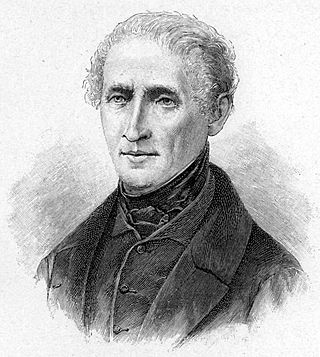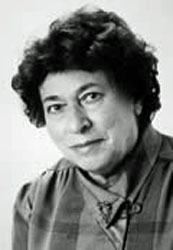Related Research Articles

Joseph Freiherr von Eichendorff was a German poet, novelist, playwright, literary critic, translator, and anthologist. Eichendorff was one of the major writers and critics of Romanticism. Ever since their publication and up to the present day, some of his works have been very popular in Germany.
Gerhard Rohlfs was a German linguist. He taught Romance languages and literature at the universities of Tübingen and Munich. He was described as an "archeologist of words".

Therese Huber was a German author. She was one of the so-called Universitätsmamsellen, a group of five academically active women during the mid-18th and early 19th centuries. The group consisted of daughters of academics at Göttingen University; Huber was noteworthy among them, alongside Meta Forkel-Liebeskind, Caroline Schelling, Philippine Engelhard, and Dorothea Schlözer.
Otfried Höffe is a German philosopher and professor.
Imanuel Geiss was a German historian.
Jochen Bleicken was a German professor of ancient history.
Otto Friedrich Bollnow was a German philosopher and teacher.

Ernst Peter Fischer is a German historian of science and science and publicist.

Kurt Flasch is a German philosopher, who works mainly as a historian of medieval thought and of late antiquity. Flasch was professor at the Ruhr University Bochum. He was / is a member of several German and international Academies. In 2000, he was awarded the Sigmund Freud Prize by the Deutsche Akademie für Sprache und Dichtung.

Walter Höllerer was a German writer, literary critic, and literature academic. He was professor of literary studies at the Technical University of Berlin from 1959 to 1988. Höllerer was a member of the Group 47, founder of the German literary magazine Akzente (1953) and the Literary Colloquium of Berlin (1963).
Heinz Ludwig Arnold was a German literary journalist and publisher. He was also a leading advocate for contemporary literature.
Ilko-Sascha Kowalczuk is a German historian and author. His work is focused on the German Democratic Republic and its Ministry for State Security.

Gerhard Zwerenz was a German writer and politician. From 1994 until 1998 he was a member of the Bundestag for the Party of Democratic Socialism (PDS).
Wolfgang Kayser was a German Germanist and scholar of literature.
Moritz Jahn was a Lower German novelist and an educator. He was also a poet, best known for writing poetry as well such as ballad, lyric, and narratives. Jahn was born in Lilienthal, a suburb in Lower Saxony to a Low German family. He was the member for Nazi Party. He has written notable books with narration such as Frangula and Lucifer. He was active from the 1920s to 1950s.

Ingeborg Weber-Kellermann was a German folklorist, anthropologist and ethnologist. She was an academic teacher, from 1946 at the German Academy of Sciences at Berlin in East Berlin and from 1961 at the University of Marburg.
Martin Sommerfeld was a Jewish emigre from Nazi Germany to the U.S. who was a professor at the University of Frankfurt and subsequently at Columbia University, the City College of New York, Smith College, and Middlebury College, where he taught German language and literature. He authored and edited a number of volumes on German literature from the 16th to the 20th centuries, and he wrote numerous contributions to the four-volume Reallexikon der deutschen Literaturgeschichte (1925–31).
Dieter Nörr was a German scholar of Ancient Law. He studied at the Ludwig Maximilian University of Munich from 1949 to 1953. After receiving his doctorate with a dissertation on criminal law in the Code of Hammurabi, Nörr undertook postdoctoral study at the University of Heidelberg and the University of Rome. He worked for a year as a post-doctoral assistant at the Institute for Criminal Law and Legal Philosophy under Karl Engisch. He received his Habilitation at the University of Munich, under Professor Wolfgang Kunkel, in 1959 with a work on Byzantine Contract Law and was promoted to Privatdozent. He then accepted the Chair of Roman and Civil Law at the University of Hamburg. In 1960, Nörr became Full Professor at the University of Münster. After he declined positions at the Universities of Hamburg, Tübingen, and Bielefeld, he returned to the Ludwig Maximilian University of Munich as Professor, Chair of Roman Law, and Director of the Leopold Wenger Institute for Ancient Legal History and Papyrus Research. His brother, Knut Wolfgang Nörr, was also a Professor of Legal History, especially Canon Law, at the University of Tübingen.

Friedrich Gustav von der Leyen was a German philologist who specialized in Germanic studies.
Ernst August Bertram was a German professor of German studies at the University of Cologne, but also a poet and writer who was close to the George-Kreis and the lyricist Stefan George.
References
- 1 2 "BERGISCHE UNIVERSITÄT WUPPERTAL :: FB A :: Allgemeine Literaturwissenschaft :: Michael Scheffel". Archived from the original on 2014-09-24. Retrieved 2014-09-21.
- ↑ "Magischer Realismus. Die Geschichte eines Begriffes und ein Versuch seiner Bestimmung"/ "Magic Realism. The history of a concept and an attempt at its confirmation"